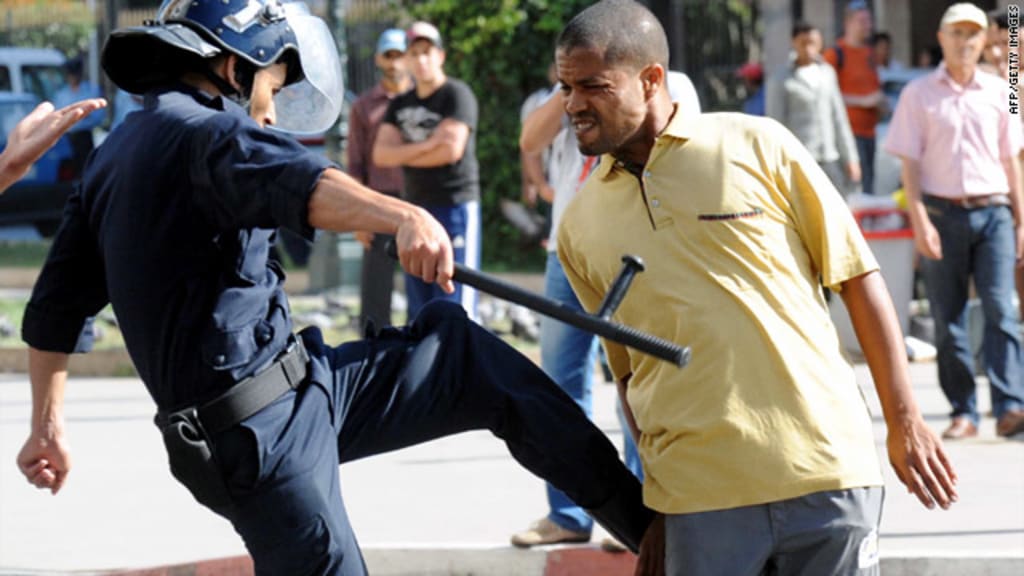The Truth Behind Police Violence in America
What Citizens Need to Know About their Law Enforcement

I finally had the courage to tell my Great Aunt Genie what I want to be when I grow up. Under my breath I said timidly, “I’m going to be a police officer”. Like always, she comes back at me with her leftist response. “Oh, dear, police are nothing like they used to be. I remember when they would protect the people, not shoot them.” I don’t know if you have ever had an elephant’s foot pound on your chest, compressing all the air out of you, but I have. I felt chained down to my chair. Her words crushed me. Hearing false stereotypes about one of the positions you’ve been dreaming about filling one day isn’t the easiest conversation to hold over Thanksgiving dinner.
My Great Aunt’s degrading tone left me paralyzed at the table. I managed to nod my head and take another forkful of mashed potatoes to the mouth. This is not the start, and I am positive it is not the end. Family, friends, teachers and even complete strangers have the audacity to tell me that I should give up on my dream of becoming a Police Officer. If they aren’t arguing about my physical capabilities they are attempting to convince my young mind that law enforcement is the devil. My research aims to prove that not all law enforcement officers are trained the same, and that there is a way to minimize this gap. Being young to the field, I can and will have a huge impact on the future. This essay is for everyone that has ever doubted me.
Much of the public sees a need for law enforcement to be better trained before they enter the workforce. Improving force accuracy with situational awareness, reducing racial bias in the deadly use of force, and martial arts training are the most common suggestions on how to improve the skills of police officers today. They make a valid point. Due to the media and the way information is presented to us, the American public has every right to believe that Police Officers are under trained. News and radio stations, blogs, newspapers, and magazines all influence our view on the world today whether we choose to admit it or not (79). Often times the credibility of events found in the media have lost validity due to the passage of information from one source to the next. I came to this realization on July 30, 2017.
On this Sunday I was on a ride-along with Deputy Sheriff Paul Nelson. After stopping at Safeway to pick up some lunch around 11:40 am, Nelson drives us to the Sheriff’s office in the fire department. In this tiny room are two desks. Sitting at one in the corner is the other on duty officer. For privacy reasons, he will be referred to as Kenny. As I was sitting near the desk by Officer Nelson, Officer Kenny chuckles while staring at his computer. “What are you laughing at”, asks Nelson with a grin on his face. He replies, “Have you seen the Wenatchee World article about the shooting on Thursday”? Kenny was referring to the shooting in the Albertsons parking lot on the 27th. This shooting involved a single officer, Albert Gonzalez, who had been working for the Wenatchee Police Department for two years. Gonzalez shot the suspect, Matthew Folden multiple times. Folden was reported to be carrying a knife and threatening other customers. “I responded to that call late Thursday night, and that is not what happened”, he exclaimed with a slightly sour tone. Hearing these officers joke about the media like this led me to believe that it happens all the time. Misinformation and how it influences the public’s eye to these issues. With this eye-opening experience, it led me to question how many other shootings are falsely reported. Granted, even with the false media representation of law enforcement, there is still some corrupt officers out there. Officers that either have extreme racial bias, refusal to accept new policies or are simply undertrained exist, and this essay will propose solutions to this as well as unforeseen perspectives on law enforcement training.
To start, I would like to point out that all Police Departments and Jurisdictions are different in the way that they hire their staff. Some departments only require a high school diploma, while others require a college degree. Although, there are some standards across the nation which law enforcement must meet on terms of education. Prerequisites to enter the police academy training program include a high school diploma or GED, 21 years of age (Etter). In the grand scheme of things, this education requirement is quite low. Many truck drivers have more education than this. Did you know that truck drivers are also required to have a high school diploma? They also need a class “D” license, and in-job training. Comparing truck drivers to police officers is a bit of a stretch, but it does put various education requirements into perspective (Truck).
In an article about education and better policing Carimah Townes, a journalist for the Fair Punishment Project writes, “A case study of Florida police officers concluded that, between 1997-2002, officers with high school diplomas accounted for 75 percent of all disciplinary actions” (Townes). These disciplinary actions include suspensions, or even terminations done by internal affairs. Assuming that these officers would not have made these mistakes having a better education would be making a very dangerous unproven assumption. However, it would be fair to assume that if just 10% of these officers did not act in a way deserving punishment it would strengthen the trust between law enforcement and the public. Education has a big impact on law enforcement behavior.
Other forms of education in law enforcement include the training. In the police academy the students are taught everything they need to know for the job.
They learn state laws, criminal investigations, patrol procedures, firearms training, traffic control, defensive driving, self-defense, first aid and computer skills. Police academy recruits also undertake physical training and fieldwork that demonstrates their comprehension of classroom instruction (Police).
While looking into the program requirements in the academy I found one major component missing. Nowhere does the curriculum mention how to prevent and diminish bias with deadly force. One of these types of bias is racial bias. Racial bias is the assumption that African Americans and other minorities are more dangerous than Caucasians. Implicit bias is related to the stereotypes associated with an area, race, or any other groupings. With police violence being a hot topic for the past ten years, one would only assume that academies would teach their officers how to deal with the issue. To get to the bottom of the Police Academy curriculum, I emailed Officer 401, a large YouTube producer who documents his life as a police officer and detective. When he got back to me he stated, “ ...most academies are the same when it comes to training. Police work isn't rocket science, just some common sense…”(Officer). His words struck me. After all the research on the specific curriculum, an officer himself explained his work in such a simple way. I was also further confused about the use of common sense. Common sense is not so much learned as it is acquired. Officer 401 said, “I think every officer is under trained when they start because there's no way to learn everything without actually doing it and being in the field”(Officer). Some knowledge simply can not be taught, and other skills can only be acquired from experience. In the police academy, they will not teach you to turn off your lights and sirens miles before reaching the scene of a robbery. Although after some experience the officer will realize that the burglars will be able to see and hear the police rushing to the scene, making it harder to catch the suspect. Simple skills, tips and tricks are better learned through experience.
Joshua Correll, a psychology and neuroscience professor at the University of Colorado, conducted a study in 2002 to determine whether there is a shooter racial bias is apparent in most people. The participants in the study were shown four background scenes, with the last scene a man. The man would either be black or white and holding either a gun or a harmless object. If the participant believes there is a gun in the man’s hand, they are to press a button that says “shoot” and if the man is holding a harmless object they are to press a button that says “don’t shoot”. Cynthia Lee, a professor at George Washington University explains the results of this study. She writes, “Participants were quicker to shoot an armed target if the target was Black than if he was White. They were also quicker to not shoot an unarmed target if he was White than if he was Black”. There are many variables to this study that make it inapplicable to police officers in a high stress situation, although it does show the deeply rooted bias against Black people. Implicit bias is deeply rooted in every one of us (Townes). Having good morals like many of us do will not get rid of this bias. Although eliminating this bias will be hard, it will be a huge step in the right direction. Even though it is not the easiest task, over time, with well thought out tactics, this bias can be distinguished.
Where police officers are trained directly affects their work in the field. Because there are different issues that each part of the country aims to solve, training may be super strong in some areas and lack in others. For example, drug and narcotic units will be much more skilled when trained in southern California rather than Idaho. And officers trained in Utah will not have as much experience with African Americans as officers in Louisiana. Many Americans see this diversity as a problem rather than a blessing. It is crucial for the police departments all across the United States to adapt to the culture in their area. Not only to understand the victims and suspects better, but to predict the future and in turn protect the public. With this said, there needs to be a more descriptive baseline for the mandatory education law enforcement officers receive. If training our police officers to recognize their bias, and correct it, could save just one innocent life, then law enforcement has done their job (Etter).
The hate and backlash against law enforcement must be stopped. Just like any other industry, time and proper resources will help it evolve to the greatest it has ever been. Starting by raising the education requirements placed on their training will kickstart this movement. In addition, implementing the shooter bias training, martial arts training and mandating a higher education for our officers will strengthen the trust between law enforcement and the public.
As for my Great Aunt Genie, and anyone else who has ever thought poorly about law enforcement's actions, I urge you to rethink your opinion with this information. It was extremely hard to stay unbiased throughout this essay, as it is equally as hard to stay unbiased in our day to day lives. Even if this entire essay was gibberish, remember that you should not judge one’s actions based on the surface of what you assume. When going deeper into this research I learned more than ever anticipated. My own personal opinions have changed, and I have never wanted to be a police officer more.






Comments
There are no comments for this story
Be the first to respond and start the conversation.